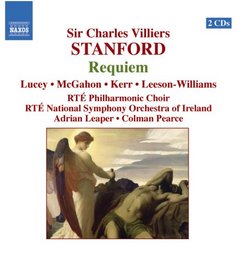Perhaps Stanford's Choral Music Masterpiece
M. C. Passarella | Lawrenceville, GA | 01/27/2008
(5 out of 5 stars)
"Though Charles V. Stanford wrote symphonies throughout his life and finally gravitated to the orchestral rhapsody, of which he also wrote quite a few, his chief contribution to English music is considered to lie in his choral music and in his teaching. He turned out an entire generation of English composers--including Bliss, Holst, and Vaughan Williams--and contributed some of the finest anthems of the 19th century, or any century, to the English choral tradition. It's kind of surprising then that his Requiem of 1897 receives, with this CD, its world-premier recording. Surprising, because it is a pretty remarkable work overall and should be heard with much more regularity and, except that it must be a bear both to perform and record, should receive more recordings as well. Because very good though the current recording is, I can imagine finer.
That said, however, Leaper's performance is certainly not to be sneezed at. He has the orchestra playing with real intensity all the way through, and their contribution is the finest thing about the recording. In fact, my objections to the recording are few. One, the soloists uniformly sing sweetly when not doing so loudly or in their upper registers, but then their tones all seem to harden and become unattractive. But Stanford does demand a lot of them. Similarly, though the chorus does mostly yeoman work throughout, they don't quite capture some of the emotional content of the work, most notably the shock and awe that the Dies Irae should convey. As with Berlioz and Verdi, this movement is clearly the center of Stanford's Requiem. Over thirty minutes long, it has at times a Verdian sense of operatic drama and some very big and crashing moments that you won't hear in Stanford's well-behaved, old-fashioned symphonies.
But as with the Dvorak Requiem (which I find kind of earnest and dull overall), the best movement is the Offertorium. The whole thing for me is a gem, including (as with Dvorak), a neatly done, smiling fugue on Quam olim abrahae. I guess the promise of God's favor to Abraham's progeny makes both of these composers smile in the midst of the serious work they're about.
And the Requiem is mostly grave and serious, with a quiet, elegiac final Agnus Dei and Lux aeterna that may leave some wishing for the operatic scena that Verdi comes up with at the end of his Requiem. But Stanford's ending, for me, is more appropriate and just as worthy a close.
None of this is to suggest that the English composer's Requiem is the equal of Verdi's or Berlioz' (though for me it is way ahead of the Dvorak, which has been recorded numerous times). There are some embarrassingly purple passages scattered throughout the Stanford, as you'd expect from a Mendelssohn-loving Victorian, and the invention is not equally fine throughout either. But then, it is a long, long work, over an hour and forty minutes in the current recording, and I'm thus gratified at how much really good music there is in the Requiem.
CD 2 ends with excerpts from Stanford's opera "The Veiled Prophet of Khorassan." I'm glad for the inclusion, though maybe one of Stanford's other choral works--say the Te Deum--would have been a better fit. The overture is a very attractive piece in which Stanford successfully manages to fuse the styles of Mendelssohn and Schumann (without successfully saying anything very original or up-to-date). The air "There a Bower of Roses," is typical Victorian starch and perfume, but the ballet music is nice in its undemonstrative way.
The sound throughout these discs is very big and impactive yet spacious, coming from the National Concert Hall in Dublin. Listening to it is like having a seat midway back in the front half of the orchestra section. Given Naxos' price, if you are at all interested in the English choral tradition and in 19th-century choral music generally, this is a worthy addition to your collection.
"


 Track Listings (5) - Disc #1
Track Listings (5) - Disc #1